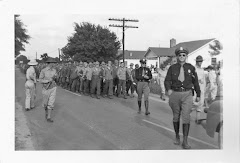I had the pleasure yesterday of giving a talk about Guests Behind the Barbed Wire to a wonderful audience of library supporters in Vestavia Hills, Alabama. Among those who attended were several people who grew up in the Aliceville area and shared their memories of the German POW camp experience in their town. Also in the audience were several American veterans who had seen combat in Germany and one man who spent time in Stalag Luft III during the war.
I hope to share more of their experiences in future blog entries, but one story I heard yesterday touched me deeply, and I wanted to share it today. One dark night on the front lines in Germany, an American soldier was in his foxhole, staring out into the night and wondering what would happen next. He heard a rustling behind him and, with chills up his spine, turned to see what had caused the noise. To his surprise, a German woman quietly handed him a freshly baked loaf of bread. "I thought maybe you had nothing to eat out here," she said.
A simple story, but one that reminds us that people care about each other, one or one, in even the most difficult and hate-filled circumstances.
That story reminded me of one I told in Guests Behind the Barbed Wire, too. A woman in Aliceville offered a German POW a glass of cold sweet tea while he was cutting her grass on a hot and humid summer afternoon. When her neighbors criticized her for "aiding the enemy," she responded quietly that her son was serving somewhere in Germany and she hoped that, if he were thirsty, a German woman would give him something to drink.
If you happened to see last weekend's edition of CBS Sunday Morning http://www.CBSnews.com/, you already know that Steve Hartman's video essay echoed this same theme some 60 years later. He sent an inflatable globe up with the last astronaut crew and asked them to randomly point to three places on the globe. He then traveled to India, Latvia, and Oman and randomly picked out three people from the local telephone books and shared their life stories.
Steve shared the common life experiences of these three people and noted that, on an individual basis, people around the world are pretty much the same as far as family concerns, ambitions, and cares. He ended his piece with a comment about how the world might improve if we could all know each other's stories.
It has been my experience that the people of Aliceville and many, many of the soldiers I have met from both sides of World War II have enriched their lives by taking time to learn each other's stories.
Friday, February 26, 2010
Friday, February 5, 2010
POW Camp Highlights from Owosso, Michigan


Although it was one of the largest, Camp Aliceville in Alabama was certainly not the only prisoner of war camp in the United States during WWII. One of my readers sent a link to the Shiawassee District Library website in Michigan for more information about Camp Owosso. Events at Owosso were the basis for Gary Slaughter's novel Cottonwood Summer, which I mentioned in a previous blog. (See October 1, 2007 blog entry.)
Camp Owosso was a much smaller operation, but like Camp Aliceville, its first prisoners came from the battlefields in North Africa. Later, prisoners from the European theater were added. In all, it is estimated that Camp Owosso held between 200 and 1,000 prisoners. They were held inside a fenced compound with tents pitched in rows. Each tent could hold six prisoners.
Most of the prisoners at Camp Owosso worked at the W. R. Roach Canning Company, but they could also be hired by local farmers. Although there were rules against fraternizing, many of the farmers included the prisoners with their family at lunchtime.
Many folks in the area remember the prisoners as "well-behaved," but there were two escape attempts. One involved some help from two local girls, and the other involved walking away from farms. In both cases, the prisoners were caught and returned to camp.
There was also a case where a group of prisoners saved a woman from a fire. The wife of the superintendent of the canning factory had just gone home after giving birth to her tenth child. A group of German POWs entered her house, wrapped her in a mattress, and carried her to safety. The POWs also helped fight the fire and saved some of the family belongings from the fire.
You can read more about this camp at the Shiawassee District Library website http://www.sdl.lib.mi.us/history/pow_camp.html. The photos above, showing POWs registering and playing soccer, are from that website. You can also read a fictionalized version of some of the Camp Owosso events in Gary Slaughter's book, Cottonwood Summer.
Subscribe to:
Posts (Atom)





